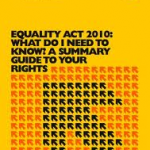 “Its given me a sense of humour failure”, was the response of Duncan Bannatyne (of the BBC’s Dragons Den) in the Daily Mail when reacting to the much maligned Equality Act 2010 which came into force on 1st October 2010. What was Duncan getting worked up about?
“Its given me a sense of humour failure”, was the response of Duncan Bannatyne (of the BBC’s Dragons Den) in the Daily Mail when reacting to the much maligned Equality Act 2010 which came into force on 1st October 2010. What was Duncan getting worked up about?
Consider this scenario.
This year you plan an office Christmas party, and on the basis of a recommendation from a fellow Chief Executive, you arrange a comedian. The comedian makes some racist remarks which several black members of staff find offensive. The next day they complain to you. They recently suffered racial taunts from a customer, and they are getting fed up with this sort of thing.
What should you do? You did not think the comedian was particularly offensive, other members of staff who are black did not complain, and in any case, these two members of staff have been known to make racist remarks themselves.
You may well feel compelled to do something, but the good news is that an employee will not have a case against you if you ignore them. The bad news is that if you ignore it when it happens again, you could be in serious trouble.
There is no cap to discrimination claims, and last year there was a successful £720k disability claim. There have been much larger out of court settlements, particularly in City law firms and bankers.
This sort of incident is called ‘third part harassment’, and one of the most notable cases occurred when Bernard Manning made some offensive remarks at a corporate event in a De Vere Hotel in 1995. In this case, the Employment Appeal Tribunal was sure that De Vere were liable, because Bernard was notorious for this sort of humour, and they should have protected their staff.
Nonetheless, since then the law has been a bit vague.
The essential purpose of the Equality Act 2010 is to tidy up legislation in this area and make discrimination law more consistent.
So, in relation to our scenario, which could equally be window cleaners or other contractors in your business. The law now says that if staff have been offended on at least two previous occasions which you know about, and it happens again, you must take reasonable steps to stop it.
You speak to the window cleaners, brief next year’s comedian, highlight the staff’s concern to the customer, or speak to the IT contractor who is continually making unwanted advances to members of your staff (apologies to window cleaners and IT contractors!). If you have done that, you are unlikely to be liable if it continues.
Not a lot to ask really, but what else does this Act contain?
For the average company, there’s not a lot to worry about, although if you have an equal opportunities policy, it may need revising some time. The main changes(and the first is probably the most significant) are:-
• unless they are really specific to the job(e.g. do you have any medical conditions that would prevent you from lifting heavy boxes?), pre job offer medical questions are no longer allowed
• pay secrecy clauses which prevent employees discussing their salary are unenforceable if the disclosure that an employee made was to ascertain whether any discrimination had taken place – non disclosure to a competitor may still be enforceable
• ‘discrimination by association’ allows a claim, for instance, from a carer of a disabled person, even though they themselves are not disabled
• increased protection for those undergoing gender reassignment
• new rules allow an employer to positively discriminate in some recruitment situations, and
• lots of technical changes that will only interest lawyers!
Rather unfairly, in a reference to the previous Deputy Leader of the Labour Party, this Act has been called ‘Harriet’s PC equality law’. The Coalition Government disagreed with some original proposals, and has removed them. Hence, there should be broad political support for what is left.
And what is left is unlikely to make much difference to reasonable employers on a day to day basis.
For further information go to the ACAS site.
Ken Allison is a ACE speaker who presents an interactive, challenging and entertaining session on employment law for busy executives. He dispels fears and explodes myths, and has provided follow up assistance to members from more than 90% of the groups he has spoken to.
© Paradigm Partners, November 2010